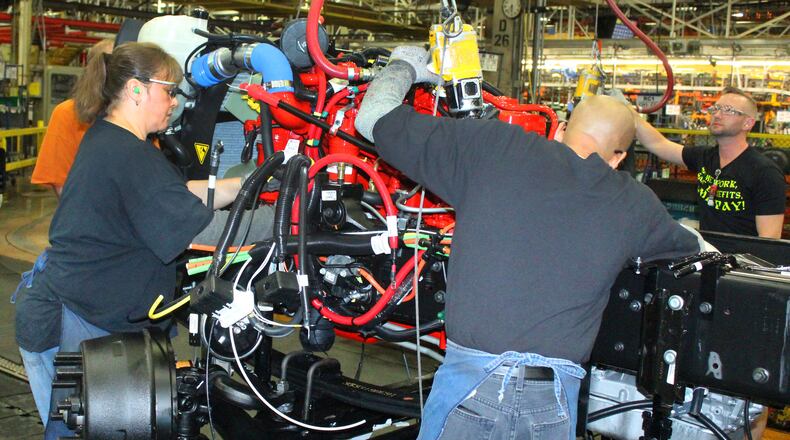“The only truthful answer to that is nobody knows,” Hill said Tuesday at the University of Dayton (UD), in a presentation of results from an annual survey of Ohio manufacturers. “But we do know the supply-side shock is going to be pretty strong.”
There has been no uptick in national jobless claims yet. But even before the COVID-19 situation, purchases of big manufacturing equipment and machine tools had slowed, Hill said.
Continually adding 200,000 jobs every month to the national economy is difficult, especially when the population isn’t keeping pace, he said.
MORE: Coronavirus concerns cause 6 local voting locations to move
MORE: Dayton leaders react to Ohio's first coronavirus cases
“Is the United States overreacting to this?” Hill asked. “I think the answer is probably yes.” At the same time, he added, the costs of “inaction” are too high.
The Covid-19 situation is changing daily, even hourly sometimes, noted Phil Raterman, director of Dayton manufacturing consultant Fastlane.
He said some manufacturers are concerned about a negative impact to sales due likely to cancelled trade shows and restricted travel.
“One (manufacturer) commented that they are holding back on discretionary spending this month, as they wait to see if their incoming order volume drops,” Raterman said. “One said they are making immediate changes to the HR (human resources) policy on absenteeism to encourage workers to not come to work sick, and to take appropriate time recover, if sick.”
Also Tuesday, Manpower released a new quarterly survey of Dayton-area employers, finding a slight dampening in local plans to hire more workers.
The new survey found that 22 percent of local respondents plan to add workers in the second quarter of 2020.
That’s down from the first quarter of 2020, when 26 percent planned to hire more workers. It’s down farther from the first quarter of 2019, when 28 percent intended to hire.
MORE: Plans process for rooftop restaurant on Dayton's tallest building
MORE: Residents skeptical of city promises of big changes for North Main Street
Dayton employers are reporting a weaker hiring pace, said Tom Maher, who owns the Dayton Manpower staffing franchise. “When looking at year-over-year expectations, hiring intentions have slowed down.”
Lower gas prices will ease pressure on consumers somewhat. But that’s not necessarily good news for Ohio, Hill said.
“The problem for Ohio is we are a natural gas-producing state, and that’s going to have some serious consequences on the eastern side of the state,” Hill said.
Exploring whether the nation is on the verge of recession, Hill said the next several weeks will be critical.
“We’re going to see if this thing lasts from four weeks to two months, then it’s going to increase the probability of a recession,” Hill told listeners at UD’s River Campus.
The survey of Ohio manufacturers, conducted by Fastlane, found 66 percent of respondents found a “lack of work ethic” among applicants was among the biggest barriers to hiring the right employees. Sixty-five percent of respondents said too many applicants lacked the right skills or education.
Often the best workers already have a job elsewhere, Hill said.
MORE:Ohio prepares for 'long haul' of coronavirus prevention
MORE: Gov. DeWine declares state of emergency after 3 Ohioans get virus
Fifty-six percent of respondents to the survey said they expected to hire in the next year, but Hill and Raterman, cautioned that these respondents answered survey questions in late December, before coronavirus became national and international news.
The main “sources of pain” for manufacturers, the survey found: The shortage of skilled workers (according to 56 percent of respondents), the cost of health insurance (31 percent) and the retirement of skilled workers (31 percent).
Thirty percent of respondents said they will try to cut costs in the next year while half said they will work to retain and develop current employees.
About the Author

